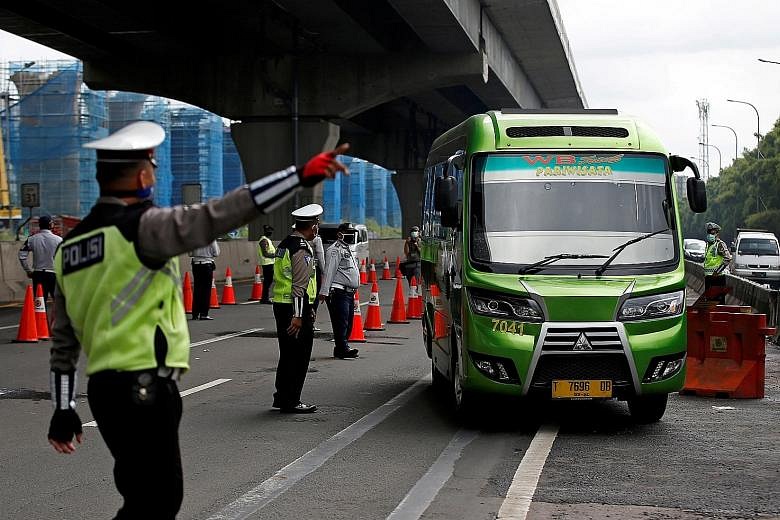Indonesia's enforcement of its ban on the annual Hari Raya Idul Fitri exodus is taking on added significance as a number of Covid-19 transmissions have been linked to those who travelled home earlier.
A survey cited by the government said 7 per cent of the people had gone home early, before the ban.
The cases include a 72-year-old grandfather in Klaten, Central Java, who contracted the coronavirus from his grandchild who returned from Jakarta in the middle of last month, according to media reports.
Late last month, a man who showed Covid-19 symptoms died in Cilacap, Central Java. The local authorities said he did not have any travel history to any red zone, where there are many infections, but his younger brother had returned with seven others from Jakarta, all of whom tested positive.
In the same month, a two-year-old infant in Garut, West Java, contracted the virus from his father, another Jakarta returnee.
Indonesians have been caught trying to sneak home by hiding in truck containers and bus trunks despite the nationwide ban on mudik, or the annual exodus back to home towns for Hari Raya Idul Fitri, which falls on May 23 and 24 this year. This is so even though offenders are subject to fines of up to 100 million rupiah (S$9,450) and up to one year's imprisonment.
The mudik ban, which took effect on April 24, is aimed at curbing the spread of the virus from Jakarta, the epicentre of the outbreak, and other high-risk regions to the rest of the vast archipelago.
But just days after it was announced, a couple were caught by police hiding under boxes of fish crackers in a truck en route to Bengkulu in Sumatra. They were stopped in Banten province, halfway from their start point of Semarang, Central Java.
In another case, a family of five's ruse was to hide in a minivan, which had supposedly stalled, and get a truck to transport it to a service station. The Jakarta family was shooting for Central Java.
Last year, 7.2 million people headed from greater Jakarta to their home towns in the western, central and eastern parts of Java and in Sumatra in the week before Idul Fitri, making this the route most travelled. About 19.5 million people made the trip home last year across the country.
The mudik ban came after an appeal for people to stay put did not have a big enough buy-in; 24 per cent of the people still wanted to go home amid the outbreak, according to the government-cited survey.
The fear is that more cases on Java island may burden health facilities in the less developed regions.
The government has ramped up capacity, opening in late March a Covid-19 makeshift emergency hospital with 1,800 beds - adding to the 3,249 beds and 1,083 isolation wards, which can hold up to four people each, at hospitals in Java.
But this is unlikely to be enough in Java, where 150 million of the country's 270 million population reside.
"Java hospital infrastructure is the highest in terms of number of beds and doctors. But if the outbreak worsens, given the population size, the infrastructure is not enough," economist Chatib Basri said in a recent conference call with investors.
Indonesia, the world's fourth-most populous nation, recorded 533 new Covid-19 cases yesterday, bringing the total to 13,645.
It also saw another 16 deaths, bringing the total toll to 959, the highest in South-east Asia.











